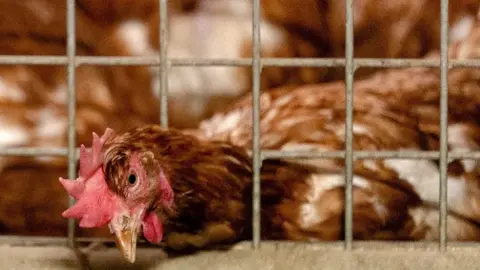Bird flu: Culls in Dutch and German farms over outbreaks
 EPA
EPAThe Dutch authorities are racing to contain a bird flu outbreak at two poultry farms and the same strain - H5N8 - has also infected chickens and wild birds in north Germany.
A farm in the eastern Dutch town of Puiflijk and another nearby have been told to cull 200,000 chickens.
Chickens are also infected at a small poultry farm in Nordfriesland, part of Germany's Schleswig-Holstein state.
H5N8 is very low-risk for humans, but the economic cost can be significant.
Health experts say people should avoid touching sick or dead birds, and chicken and eggs are safe to eat if cooked thoroughly, as that kills the virus.
A poultry farm in Frodsham, north-west England, also has cases: a cull of 13,000 birds was ordered there on Monday.
A smaller cull is under way at a farm in Kent, in the south-east, where the H5N2 avian influenza strain was detected this week.
H5N8 has been detected in migratory birds from Russia. A huge cull was carried out on farms in Russia's western Kostroma region late last month, to contain an outbreak.
The Dutch farms affected are just outside Nijmegen, 30km (19 miles) from the German border.
Containment zones have been set up around the farms, as well as around the north German farm in Oland, Nordfriesland. Farmers have been urged to keep their poultry indoors.
German public broadcaster NDR says more than 1,000 dead wild birds - mainly geese and ducks - have been found on the Nordfriesland coast, most likely infected with bird flu.
Germany's worst bird flu outbreak was in 2016-2017, when more than 900,000 birds were culled nationally.
The Netherlands is Europe's largest exporter of chicken meat and eggs, employing 10,000 people on 2,000 farms.
The Dutch culled more than 30 million chickens, ducks and other fowl in a major bird flu outbreak in 2003, the BBC's Anna Holligan reports from The Hague.
